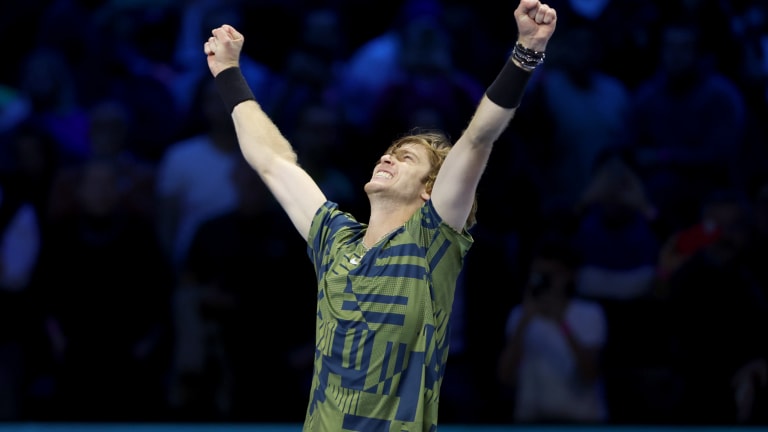ATP Finals
Stefanos Tsitsipas falls to player with "few tools," as Andrey Rublev proves the canvas master in ATP Finals win
By Nov 18, 2022ATP Finals
Inspired by Nadal, Cahill, respect abounds in Alcaraz-Sinner rivalry
By Nov 20, 2025ATP Finals
How the rivalry between Jannik Sinner and Carlos Alcaraz dominated tennis in 2025
By Nov 17, 2025ATP Finals
ATP Finals takeaway: Jannik Sinner walks the walk on making changes to Carlos Alcaraz matchup
By Nov 16, 2025ATP Finals
Jannik Sinner tops Carlos Alcaraz to retain ATP Finals title, ends 2025 on 15-match win streak
By Nov 16, 2025ATP Finals
Carlos Alcaraz meets Jannik Sinner for ATP Finals trophy | Preview, Pick, Where to Watch
By Nov 15, 2025ATP Finals
"Felt like I could do everything": Carlos Alcaraz books dream ATP Finals title tilt with Jannik Sinner
By Nov 15, 2025ATP Finals
ATP Finals: Carlos Alcaraz vs. Felix Auger-Aliassime | Preview, Pick, Where to Watch
By Nov 14, 2025ATP Finals
Felix Auger-Aliassime: "Beautiful night" in Turin came from riding wave of self-belief against Alexander Zverev
By Nov 14, 2025ATP Finals
ATP Finals: Alex de Minaur vs. Jannik Sinner | Preview, Pick, Where to Watch
By Nov 14, 2025Stefanos Tsitsipas falls to player with "few tools," as Andrey Rublev proves the canvas master in ATP Finals win
The No. 6 seed ended the Greek's 2022 season with a 3-6, 6-3, 6-2 victory Friday to reach the semifinals in Turin.
Published Nov 18, 2022
Advertising

Rublev completed the semifinal lineup in Turin, where he'll meet Casper Ruud Saturday evening.
© Getty Images